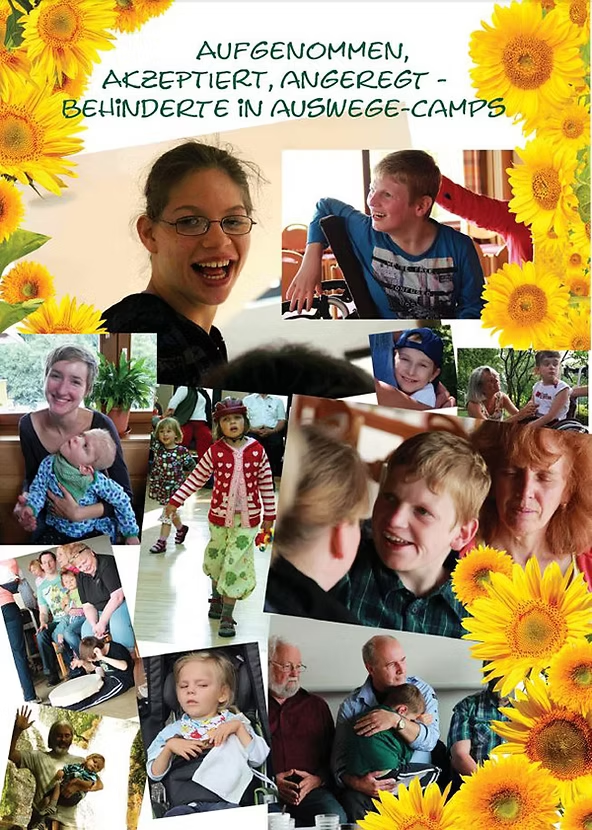by Dr.Harald Wiesendanger– Klartext
What the mainstream media is hiding
Giving birth to a disabled child? Enduring the associated stress, worry, and fear? Enduring social exclusion? 94 percent of all pregnant women whose unborn child is diagnosed with trisomy 21, Down syndrome, choose an abortion. In doing so, they are apparently missing out not only on a fateful opportunity for self-discovery and inner growth but also on a special joy in life. This is suggested by a remarkable Canadian study – as well as moving experiences in the therapy camps run by my AUSWEGE foundation /WAYS OUT Charity.

One in ten children worldwide lives with some form of disability—around 240 million, according to UNICEF estimates. Nearly 100 million are physically impaired, 34 million are deaf, and 1.4 million are blind. Tens of thousands are affected by Down syndrome. The spectrum of possible disabilities ranges from cerebral palsy to muscular dystrophy, spina bifida, and malformed limbs to metabolic disorders that affect the brain, such as phenylketonuria.
And what if such a child were yours?
What does it mean for parents to give birth to and raise a child who may be even more severely impaired—with no hope of recovery?
A research team from the University of Montreal, Canada, led by neonatologist Annie Janvier, surveyed 332 parents of 272 children with disabilities even more severe than Down syndrome – trisomy 13 (Patau syndrome) – or trisomy 18 (Edwards syndrome) (3) – about their life satisfaction. Shouldn’t they be depressed and desperate, constantly struggling with their fate?
The results of the study are astonishing.
In trisomy, each cell in the body contains three copies of a specific chromosome – numbered 13, 18, or 21 – instead of the usual two. This anomaly leads to numerous peculiarities: Down children are mentally disabled, extremely susceptible to infections, and are notable for their Asian-looking eyes – hence the common term “mongolism” – and one in two cases has a heart defect. The effects of trisomies 13 and 18 are even more serious: Internal organs are often severely malformed. Due to deformed jaw and facial bones, the children cannot breathe independently through their noses and can barely or not swallow at all. Most have heart defects. The eyes and kidneys, the urinary and gastrointestinal tracts are malformed, and often the face as well. The cerebellum, which controls balance, perception, pain, and hunger, among other things, is often atrophied. Those affected are blind or deaf. Some have no diaphragm, others have an “open back,” and all are short in stature. They often require artificial nutrition and ventilation, which is why they spend their few weeks of life in the intensive care unit, attached to tubes and cables. At some point, some giggle and laugh spontaneously but do not respond when smiled at or spoken to; they cannot lift their heads, and their faces remain motionless. Some learn to sit up, but very few can ever walk or talk.
Many are stillborn or die within the first twelve months. (At the time Janvier collected his data, only 79 of the 272 children were still alive; their average age was four years.)
On average, children with Down syndrome survive for just 2.5 to 14.5 days, and only one in twelve live-born children survive their first year. Only in rare cases do they reach the age of 12, 13, or even 18.
Against medical advice
Most doctors strongly advise expectant mothers with such a fatal prenatal diagnosis to have an abortion, try to persuade them to fight for their child, and categorically oppose life-saving measures if it does come into the world – not necessarily out of callousness, but out of awareness of personal risks: A doctor who helps such a child survive runs the risk of being accused by the health insurance company of “medical malpractice” – they clearly did not adequately inform the parents about the consequences of such a genetic defect; otherwise they would naturally have had an abortion – and of having the costs of life-prolonging measures reimbursed from their liability insurance. And the parents, too, could hold the doctor retroactively liable if they later regret their decision to have a child, based on a new patient rights law: Because the doctor failed to warn them urgently and comprehensively, the doctor would have to co-finance the child’s maintenance costs.
Nevertheless, such children can apparently bring happiness to their parents: No fewer than 97 percent of the mothers and fathers surveyed stated that they lead fulfilling lives themselves and that their child is happy – and that their child’s existence enriches family life and their relationship.
“Our study shows,” says Annie Janvier in the journal Pediatrics, “that parents who find a way to accept and love their disabled child experience happiness and enrichment.”
How well-affected parents cope with such an exceptional situation depends crucially on the amount of understanding and support they receive from partners, relatives, and friends. Indeed, many of them feel excluded, abandoned, and sometimes even downright hostile. The high level of caregiving requires enormous energy; it is exhausting and overburdened. Nevertheless, positive aspects and deeply fulfilling moments of happiness seem to outweigh the negative ones.
In stark contrast to this is the grim picture frequently painted by doctors: 87 percent of parents surveyed stated they were told during pregnancy that such a child would be “incompatible with their lives.” One in two couples were told that the child would simply “vegetate” and “eke out an existence of suffering.” One in four was said that such a child would “destroy our family life and our relationship.”
And what if a severely disabled child dies early? After their death, almost all of the parents who accompanied them say: “We are glad we had this child.”
These results are almost unbelievable—but they have since been confirmed by another, even larger study from Queen Mary University of London. It included parents of 326 children with trisomy 18 and 142 with trisomy 13. (2)
AI Isn’t Surprised
Even if artificial intelligence supposedly lacks empathy, it sometimes finds answers we otherwise only get from particularly empathetic people. “Can severely disabled children make their parents happy?” I ask ChatGPT. At least for this answering machine, that’s beyond question. “Yes, absolutely—maybe not always in the way society often expects, but in profound, meaningful ways,” the AI explains. “Many parents report that their disabled child gives them a completely new perspective on life—what truly matters, what unconditional love looks like, how much power can lie in small moments. A very special kind of connection often develops, characterized by intensity, trust, and deep emotional exchange—even if the child cannot speak or move. Of course, there are challenges, sometimes major ones. There may be phases of grief, exhaustion, or being overwhelmed—that is real and important to acknowledge. But that does not exclude happiness. It can even be felt more intensely, precisely because it is not something to be taken for granted.” (3)
The Journey to Iceland – A Parable
The American writer Emily Kingsley – who wrote for decades for the television series “Sesame Street” starting in 1970 – illustrates what it means to live with a disabled child in a moving parable. In 1974, she gave birth to her son Jason – who had Down syndrome, or trisomy 21. She has since reworked this experience in numerous books and articles. I have slightly adapted her text “The Journey to Holland” to “The Journey to Iceland.”
When you’re expecting a child, it’s like planning a long-awaited trip to Spain. Full of joyful anticipation, you cover yourself with brochures and books about this Mediterranean vacation paradise. You ask for advice at the travel agency, browse through illustrated books, and read enthusiastic online testimonials from vacationers who have already been there…
You’re looking forward to flamenco and paella, to swimming and sunbathing on the beaches of the Costa Brava. You already see yourself exploring the breathtaking landscapes of the Pyrenees and the Sierra Nevada. You picture yourself strolling through the picturesque old towns of Toledo, Cordoba, and Seville. You see yourself standing in Barcelona’s magnificent Sagrada Familia, the Palacio Real in Madrid, the Alhambra in Granada, the bullring, and the Alcazar in Valencia. Maybe you’ll even take a language course to learn a few words of Spanish.
After months of anxious anticipation, the long-awaited day finally arrives. You pack your bags, drive to the airport, check in, and the plane takes off.
A few hours later, the plane lands. Over the onboard loudspeaker, you hear the friendly voice of the pilot: “Welcome to Iceland!”
You’re thunderstruck. You jump up in a huff and complain to the flight attendants: “Iceland? What? I booked a trip to Spain! I’ve dreamed of traveling to Spain my whole life!”
But the flight schedule has been changed. You’ve now landed in Iceland, and you have to get off and stay here. There’s no return flight.

How big is this catastrophe really? You haven’t been brought to a filthy country plagued by war, disease, and famine. It’s just different from Spain—not as spectacular, not as popular.
What you need now are new books and travel brochures. You have to learn a new language. And you meet other people you would never have met in Spain.
But after spending some time in this place and recovering from the initial shock, you begin to look around. And you learn and experience that Iceland has magnificent, largely untouched landscapes to offer. You enjoy breathtaking waterfalls and boat rides along picturesque fjords and marvel at the midnight sun in June. You explore Europe’s largest and most impressive glacier by snowmobile. You’re inspired by Reykjavik’s art and culture scene; you soon discover your new favorite restaurant, where you feast on the most delicious seafood. You make friends with fellow travelers who have also found their way to Iceland. And gradually, your initial horror subsides, your bitterness begins to diminish.
Meanwhile, everyone you know from your previous life is still busy coming to or going to Spain. You hear them raving, and you’ll never completely stop envying them. For the rest of your life, you’ll say to yourself, “Oh yes, Spain! I had planned my trip there too! But it turned out completely differently!” Your pain will never fully subside because the loss of a lifelong dream weighs heavily.
“But if you spend the rest of your life mourning the shattered dream of traveling to Spain,” Emily Kingsley’s parable ends, “you will never be free within yourself to enjoy the special and wonderful aspects of Iceland.”
(Harald Wiesendanger)
Notes
(1) Annie Janvier, Barbara Farlow, and Benjamin S. Wilfond: “The Experience of Families With Children With Trisomy 13 and 18 in Social Networks“. Pediatrics, 23. Juli 2012.
(2) Jianhua Wu/Anna Springett/Joan K. Morris, “Survival of trisomy 18 (Edwards syndrome) and trisomy 13 (Patau Syndrome) in England and Wales 2004–2011 “, American Journal of Medical Genetics 161 (10) 2013, S. 2512–2518.
(3) ChatGPT am 12. April 2025.
An earlier version of this article can be found in my book Auswege – Kranken anders helfen (2015).
Aufgenommen, Akzeptiert,Angeregt – Behinderte in AUSWEGE CAMPS/ Ways Out Camps

Support “Ways Out Charity“! With your support, we can help and move forward. Click here
